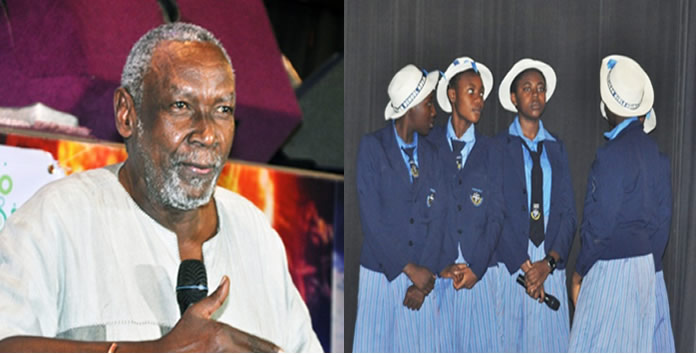
You can contribute to this web journal by sending your commentaries and reports to: info@nreportonline.com
Education and Politics: An African Story
By Lindsay Barrett
Prof. Okello Oculi (left) introduces Prof. Mwesiga Baregu (right) and Dr. Wole Olaoye moderator of the event (centre) to the audience

Photo left: Prof. Baregu. Photo right: The “leaders” : students of Anglican Girls Grammar School, Apo, chatter onstage as African leaders at the AU.
In November of last year we witnessed an impressive, although inadequately publicised, encounter between the generations when Professor Mwesiga Baregu, a brilliant septuagenarian academician from Tanzania presented a lecture to a small audience at the Nigerian Labour Congress Auditorium in Abuja. The majority of those present were senior students of the Anglican Girls Grammar School, Apo. While the Professor distilled a key lecture of his that had been presented earlier at the National War College into an informal address, the young ladies presented a dramatic rendition of simulated speechmaking by African leaders at a summit of the African Union based on the work of the Ugandan writer and teacher Okello Oculi.
Okello runs an outreach program through which he invites illustrious teachers from other parts of Africa to Nigeria to interact with their peers and Nigerian students. He also organises Pan African dialogue sessions in secondary schools in an effort to expand the horizons of consciousness of the younger generation. The November encounter was therefore a meeting of the two trajectories of his initiative, which are meant to broaden the understanding and concern for continental issues as an integral element of the educational agenda throughout Africa. In this light Professor Baregu’s discourse could not have been more appropriate. The erudite and highly experienced pedagogue showed his pedigree in no uncertain terms as he reduced a complex and comprehensive paper to a short but nonetheless enlightening discourse on the subject of democratic politics as it relates to education in post-colonial Africa.
Prof Baregu’s central theme is that in many African nations, including his homeland Tanzania, the introduction of competitive multi-party politics has brought about a deliberate downgrading of the institutional development of educational excellence. According to him there is evidence to show a profound correlation between falling educational standards and the continuation of the ruling parties in power. In fact he had discovered that ruling parties tend to be challenged more in districts where the better educated were in the majority, and to enjoy ascendancy in the areas where less privileged and educationally challenged communities prevailed. He asserted that the growth of this syndrome had become so pervasive in African democracies that it might well be considered to be the consequence of a deliberate policy meant to perpetuate the hold on power by the ruling parties.
In explaining how this systematic undermining of the educational advancement of the people aided the growth of so-called democratic practice in Africa Prof Baregu identified what he described as “manufactured legitimacy” as the main implement that some leaders employed in their effort to hold on to power. This he said was being promoted in opposition to the development of “organic legitimacy” which should spring from the people’s assessment of the performance and abilities of their elected representatives. At the end of his discourse Prof Baregu thanked the girls for their performance as leaders and exhorted them to consider the reality of leadership in Africa as a harbinger of future growth rather than simply as an opportunity to obtain the prerequisites of power. In doing so he said they would use their education to overcome rather than to join the forces that were undermining the popular will in the service of political opportunism under the guise of sustaining democratic practice.
Anyone who witnessed this interaction between two generations of Africa’s educated elite drawn from different perspectives could not help but be impressed by the synergy of their relationship. The young girls performed with commendable dedication and apparent conviction and the old warrior seemed to be inspired by their innocence. This was a day of African storytelling reminiscent of the ancient traditions of the elders passing on the wisdom of the ages to the young around the village hearth. Okello’s initiative as witnessed on that November day was a modern version of an ancient practice that could have a truly powerful effect on the minds of the younger generation and give resonance to the reflections of the older.
Contact us: info@nreportonline.com © Copyright 2016 NREPORT All Rights Reserved